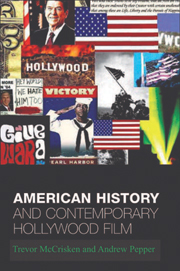Book contents
- Frontmatter
- Contents
- Acknowledgements
- Preface
- Introduction
- 1 Lessons from Hollywood's American Revolution
- 2 Rattling the chains of history: Steven Spielberg's Amistad and ‘telling everyone's story’
- 3 Hollywood's Civil War dilemma: to imagine or unravel the nation?
- 4 Saving the Good War: Hollywood and World War II in the post-Cold War world
- 5 Oliver Stone and the decade of trauma
- 6 From Civil Rights to Black Nationalism: Hollywood v. black America?
- 7 Hollywood's post-Cold War history: the ‘righteousness’ of American interventionism
- Select Bibliography
- Index
Preface
Published online by Cambridge University Press: 05 August 2013
- Frontmatter
- Contents
- Acknowledgements
- Preface
- Introduction
- 1 Lessons from Hollywood's American Revolution
- 2 Rattling the chains of history: Steven Spielberg's Amistad and ‘telling everyone's story’
- 3 Hollywood's Civil War dilemma: to imagine or unravel the nation?
- 4 Saving the Good War: Hollywood and World War II in the post-Cold War world
- 5 Oliver Stone and the decade of trauma
- 6 From Civil Rights to Black Nationalism: Hollywood v. black America?
- 7 Hollywood's post-Cold War history: the ‘righteousness’ of American interventionism
- Select Bibliography
- Index
Summary
In the early stages of planning for this book, we were struck by a number of related circumstances. First, working as we both did then in American Studies departments in the United Kingdom, we had noticed a growing preference for using films to ‘teach’ American history and were both excited and concerned by such a development. From our own experiences, we knew that films which featured episodes and events from American history engaged the interest of students and potentially raised some intriguing questions about historical truth, realism, genre, Hollywood and ideology. The assumption that Hollywood films constituted unambiguous and unproblematic historical texts, however, needed to be well and truly resisted. About the same time, we started to notice the sheer number of contemporary Hollywood films being made that focused on American history as their subject. Indeed, a steady flow of new releases throughout the late 1980s and 1990s suggested a growing interest both on the part of filmmakers and audiences in questions of public history, nation and national identity. Glory, Born on the Fourth of July, Heaven and Earth, Malcolm X and JFK were followed in quick succession by Saving Private Ryan, Nixon, The Thin Red Line, Three Kings, Amistad, Ride with the Devil, U-571, The Patriot, Pearl Harbor and Black Hawk Down. The initial impetus for this book, therefore, came from a desire to explore Hollywood's renewed interest in American history and analyse these films in pedagogical terms.
- Type
- Chapter
- Information
- American History and Contemporary Hollywood Film , pp. viii - xiiPublisher: Edinburgh University PressPrint publication year: 2005

